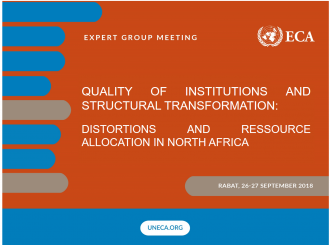
Rabat, 26 September 2018 (ECA) – The ECA Office in North Africa initiated today in Rabat (Morocco) an expert group meeting under the theme: “Quality of institutions and structural transformation: distortions and resource allocation in North Africa”
In the next two days, governance and public policy experts, international organization representatives and officials from member countries (Algeria, Egypt, Mauritania, Morocco, Sudan and Tunisia) will examine the relationship between the quality of institutions and structural transformation.
This meeting aims to better understand the impact of institutions on the allocation of resources within countries as they can, in some cases, cause distortions with negative repercussions on the performance of economic players and limit or slow down structural transformation. Participants will therefore study the positive impact of improved resource allocations between economic sectors or within them and which policies should be implemented to achieve greater productivity.
Since 2010, North Africa has experienced limited and volatile growth due to political instability, the lack of economic diversification and their strong dependency on primary sectors (agriculture, hydrocarbons, etc.). This situation has led to the emergence of endemic unemployment, with an average, unemployment rate of 12%, youth unemployment of 30% and female unemployment of more than 40% in the sub-region.
North Africa is also characterized by relatively low labour productivity, comprised between 6.23% and -1.2% depending on countries, presenting a modest performance compared to other countries such as Turkey (8%) or India (16.8%) between 1994 and 2013.
“The study our office has carried out shows the existence of inefficient production factor allocation in North Africa. It reveals the sources of these distortions by observing the job and credit markets as well as other factors such as bureaucracy, corruption or the existence of privileges benefiting companies that are not necessarily the most productive or innovative ones on the market”, said Ms Lilia Hachem Naas, director of the ECA office for North Africa in her opening speech.
“Structural transformation is a development issue which requires a very thorough diagnosis. Public, fiscal and monetary policies play a key role in this area”, said Mr Ayache Khellaf, Director of forecasting and prospective studies at the High Commission for Planning of Morocco. “When talking about structural transformation, and also, when investing in human development, it is important not to forget the productive sectors to achieve stronger, job-creating growth”, he added.
This event aims to encourage member countries to make a better use of available data and gather the additional information needed to draw policy guidelines and reforms that can bring suitable solutions to growth and job creation issues in North Africa.
جودة السياسات العمومية، أمر حاسم للتحول الهيكلي وخلق فرص العمل (بيان صحفي)
For more information about this event:
ECA calls for improved access to data for a deeper analysis of economic distortions
Executive summary and recommendations
(Aide-memoire in Arabic) - مذكرة
(Executive summary and recommendations in Arabic) - الملخص والتوصيات
Communication Team
Economic Commission for Africa
Office for North Africa
Tel: +212 (0) 537 548 749
Email: filali-ansary@un.org; cea.an.coms@gmail.com